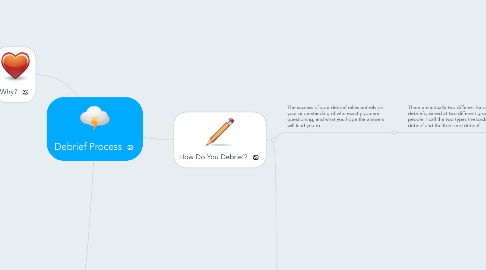
1. Why?
1.1. To get valuable feedback, streamline your process, enhance your attendee experience, and further cement relationships with your team and partners.
1.2. Debriefing an event/program simply means asking a series of targeted questions about the event/program itself.
1.3. This is important because taking the time to analyze the event,program you just produced has several benefits, the largest of which is a firm and tangible grasp on what happened, and how you can build upon that experience in the future.
1.4. Honest and accurate feedback allows for you as the planner to make better business decisions about each event/program you put together.
1.5. A debrief produces a concrete list of what worked, what didn’t, and what relevant people (your attendees, sponsors, vendors, etc.) want to see at your next event/program. Debriefs are the prelude to event/program innovation.
2. In Conclusion
2.1. Debriefing your event/program is a crucial step in gathering the feedback necessary to keep your events/programs innovative and efficient.
2.2. Conducting both a back end and a front end debrief will ensure that you know exactly how everyone involved feels about the event/program you produced.
2.3. You will also have a working knowledge of what worked, what didn’t, and how you can build on that information to keep yourself, your clients, your partners and your attendees happy and coming back for more.
3. How Do You Debrief?
3.1. The success of your debrief relies entirely on your understanding of who exactly you are questioning, and what you hope the answers will lead you to.
3.1.1. There are actually two different kinds of event debriefs, aimed at two different groups of people. I call the two types the back end debrief and the front end debrief.
3.1.1.1. Debriefing the back end of your event requires that you analyze how effective the physical planning of the event was.
3.1.1.1.1. These questions are aimed at your team and your vendors, and will primarily focus on productivity, ease of task implementation, and the flow of information.
3.1.1.1.2. Back end debriefs can often be handled with a short, (no longer than a half hour) meeting, where you and your team discuss the goals of the event, if they were met, and how each person on your team felt about their ability and proficiency to complete their assigned tasks.
3.1.1.1.3. The Back End Debrief– We’ve already established that the primary focus of a back end debrief is to iron out how well the event was planned and executed. In order to discern this, consider asking your team, sponsors, and vendors some of the following questions:
3.1.1.2. A front end debrief analyzes attendee experience and engagement.
3.1.1.2.1. Front end debriefs can take the form of a live Q+A session at the event, short surveys that are integrated with an event app that ask for feedback after each session, a longer survey sent out post event, an email or social media campaign asking for feedback in an inventive way, or even in a little research, where you see what attendees are saying about their experience at your event on various online channels.
3.1.1.2.2. These are questions you will pose directly to your target audience, and they will deal primarily with content and activity satisfaction, customer service, and user experience.
3.1.1.2.3. A front end debrief is entirely about attendee experience and engagement. Basically, you want to know if your attendees had fun or walked away with something valuable, how they received your event messaging, and how you can make their experience better in the future. In today’s hyper digital world, there are many innovative ways to tackle your front end debrief. The traditional feedback form, is extremely outdated. And though the information you’re trying to obtain is the same, technology has made getting it much easier (and sexier) than filling out a mail-in questionnaire. Feedback from your attendees can be gotten:
